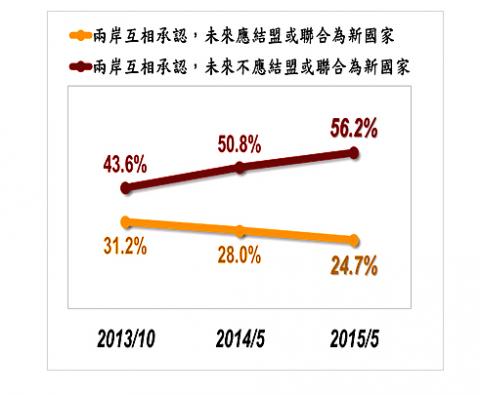More than 60 percent of respondents disagreed with Chinese Nationalist Party (KMT) Chairman Eric Chu’s (朱立倫) comment that “both sides of the Taiwan Strait belong to ‘one China,’” a poll released yesterday by Taiwan Indicators Survey Research showed, while only 26.7 percent agreed with the statement.
Chu made the comments during a meeting with Chinese President Xi Jinping (習近平) in Bejiing on May 4. Chu later said that the “one China” he spoke of referred to the Republic of China (ROC), not the People’s Republic of China (PRC).
Asked whether Taiwan and China belong to “one China,” 61.6 percent of respondents opposed the idea, 26.7 percent were in favor and 11.7 percent said they had no opinion on the matter or were neutral, the poll showed.

Image provided by TISR
The survey showed that 41.2 percent of respondents said that the talks in Beijing were more favorable to China, while 15.7 percent said they favored Taiwan.
The poll asked: “In the event of Taiwan and China mutually recognizing each other as rightful governments, should both sides enter into an alliance as two nations or merge and become a single country?”
Among respondents, 56.2 percent opposed an alliance, while 24.7 percent supported the idea and 19.1 percent said they had no opinion on the matter.
An analysis of the poll results showed that among pan-blue supporters, 47.5 percent opposed an alliance, while 42.7 percent supported the notion.
When asked who among Chu, Legislative Speaker Wang Jin-pyng (王金平) and Vice President Wu Den-yih (吳敦義) — seen as potential KMT nominees for next year’s presidential election — would best preserve Taiwanese sovereignty, prioritize Taiwan’s safety and maintain cross-strait relations, Wang was ranked No. 1 by 36.9 percent of respondents, Chu was backed by 26.5 percent and Wu by 4.9 percent, while 12.8 percent said that none of the three would meet their expectations, 1.3 percent said all three were up to the task and 17.6 percent did not respond or said they did not know.
The survey was conducted on Monday and Tuesday.
It collected 1,004 valid samples from people aged 20 or above. It has a margin of error of 3.1 percentage points.

Tropical Storm Gaemi strengthened into a typhoon at 2pm yesterday, and could make landfall in Yilan County tomorrow, the Central Weather Administration (CWA) said yesterday. The agency was scheduled to issue a sea warning at 11:30pm yesterday, and could issue a land warning later today. Gaemi was moving north-northwest at 4kph, carrying maximum sustained winds near its center of up to 118.8kph and gusts of 154.8kph. The circumference is forecast to reach eastern Taiwan tomorrow morning, with the center making landfall in Yilan County later that night before departing from the north coast, CWA weather forecaster Kuan Shin-ping (官欣平) said yesterday. Uncertainty remains and

SEA WARNING LIKELY: The storm, named Gaemi, could become a moderate typhoon on Wednesday or Thursday, with the Taipei City Government preparing for flooding A tropical depression east of the Philippines developed into a tropical storm named Gaemi at 2pm yesterday, and was moving toward eastern Taiwan, the Central Weather Administration (CWA) said. Gaemi could begin to affect Taiwan proper on Tuesday, lasting until Friday, and could develop into a moderate typhoon on Wednesday or Thursday, it said. A sea warning for Gaemi could be issued as early as Tuesday morning, it added. Gaemi, the third tropical storm in the Pacific Ocean this typhoon season, is projected to begin moving northwest today, and be closest to Taiwan on Wednesday or Thursday, the agency said. Today, there would likely

DISRUPTIONS: The high-speed rail is to operate as normal, while several airlines either canceled flights or announced early departures or late arrivals Schools and offices in 15 cities and counties are to be closed today due to Typhoon Gaemi, local governments announced last night. The 15 are: Taipei, New Taipei City, Taoyuan, Tainan, Keelung, Hsinchu and Kaohsiung, as well as Yilan, Hualien, Hsinchu, Miaoli, Chiayi, Pingtung, Penghu and Lienchiang counties. People should brace for torrential rainfall brought by the storm, with its center forecast to make landfall on the east coast between tonight and tomorrow morning, the Central Weather Administration (CWA) said. The agency issued a sea warning for the typhoon at 11:30pm on Monday, followed by a land warning at 11:30am yesterday. As of

CASUALTY: A 70-year-old woman was killed by a falling tree in Kaohsiung as the premier warned all government agencies to remain on high alert for the next 24 hours Schools and offices nationwide are to be closed for a second day today as Typhoon Gaemi crosses over the nation, bringing torrential rain and whipping winds. Gaemi was forecast to make landfall late last night. From Tuesday night, its outer band brought substantial rainfall and strong winds to the nation. As of 6:15pm last night, the typhoon’s center was 20km southeast of Hualien County, Central Weather Administration (CWA) data showed. It was moving at 19kph and had a radius of 250km. As of 3pm yesterday, one woman had died, while 58 people were injured, the Central Emergency Operation Center said. The 70-year-old